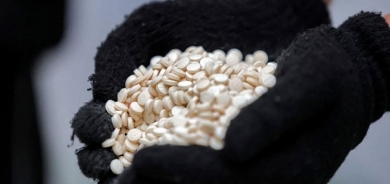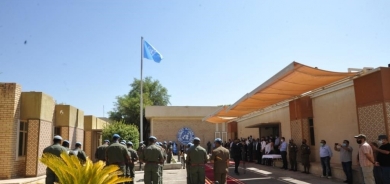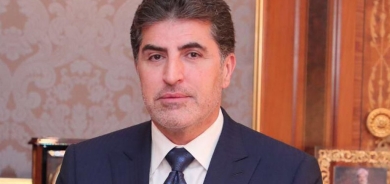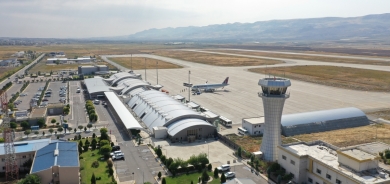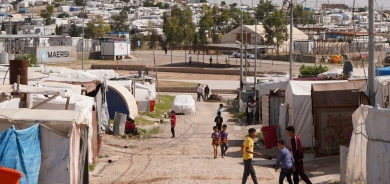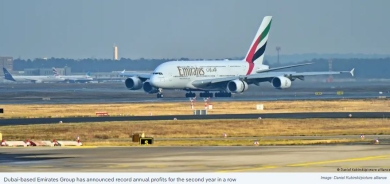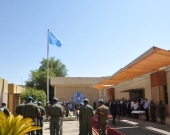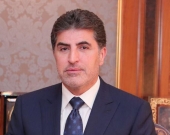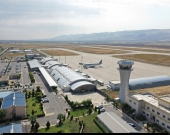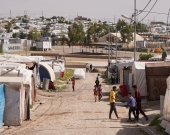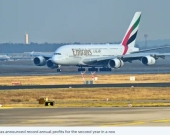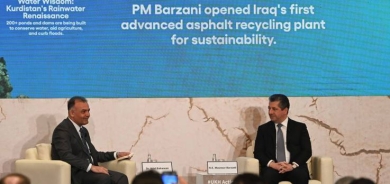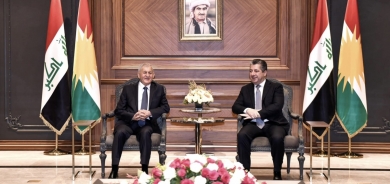Syria conflict: US says Assad can have no post-war role
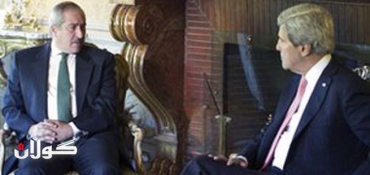
The comments followed reports that the US was softening its insistence on Mr Assad's departure as a precondition for any deal - as demanded by rebels.
That had been opposed by Russia, which this week backed a conference to seek a political solution to the Syrian war.
Meanwhile, Jordan said Syrian refugees now make up 10% of its population.
Foreign Minister Nasser Judeh said that by the end of the year that figure could reach 25%, and 40% by mid-2014.
Mr Kerry announced a further $100m (£64m) in aid for Syrian refugees, $43m of which would go to Jordan.
'Very positive response'
Speaking to reporters in Rome, Mr Kerry said Mr Judeh would work with the US on "a transition government by mutual consent of both sides, which clearly means that in our judgement President Assad will not be a component of that transitional government".
Later, Mr Kerry said it was "very significant" that Russian Foreign Minister Sergei Lavrov had said Moscow "was not tied to any one person" and had backed the idea of transitional government.
"There is no way that anybody here believes that the opposition is ever going to give consent to President Assad to be running that government."
Russia, a permanent member of the UN Security Council, has previously blocked international efforts to put pressure on Mr Assad or offer support for the Syrian opposition.
Israel has warned the US of Russian plans to sell an advanced surface-to-air missile defence system to Syria, according to a report in the Wall Street Journal. Mr Kerry declined to comment on the specifics of the report, but said such a sale would be "potentially destabilising" for Israel.
"I think we have made it crystal clear that we would prefer that Russia is not supplying assistance," he said.
Mr Kerry said there had been a "very positive response" to the US-Russian proposal for an international conference on Syria, announced after Mr Kerry held talks in Moscow this week.
The conference will try to persuade both the Syrian government and opposition to accept a solution based on the final communique of a meeting of the UN-backed Action Group for Syria last June.
The communique called for an immediate end to violence, and the establishment of a transitional government that could include officials serving under President Bashar al-Assad as well as members of the opposition.
"We are going to forge ahead very, very directly to work with all of the parties to bring that conference together," Mr Kerry said on Thursday.
Syria's foreign ministry welcomed what it called the US-Russian "rapprochement".
State media quoted the ministry as praising "the firm Russian stance which is based on the UN principles of non-interference in internal affairs or the threat to use force against the safety of any state".
Meanwhile, the leader of Lebanese militant group Hezbollah, Hassan Nasrallah, re-iterated his support for Mr Assad's regime.
He said Hezbollah was ready to receive sophisticated new weapons that would "break the balance of forces".
He also said Hezbollah was prepared to help open a front against Israel on the Golan Heights, Syrian territory occupied by Israel since the 1967 war.
'Force a transition'
British Prime Minister David Cameron, who is due to fly to Moscow for talks with Mr Putin about Syria on Friday, said there was an urgent need to "force a political transition" in Damascus.
Mr Cameron also told parliament on Wednesday that there was a "growing body of limited but persuasive information showing that the regime has used and continues to use chemical weapons, including sarin".
After Moscow, Mr Cameron will travel to the US, where he is also expected to discuss Syria. The UK is pushing for the EU arms embargo against the main Syrian opposition group, the National Coalition, to be lifted or amended.
Last week, the US said it was reconsidering its opposition to supplying weapons to rebel forces.
More than 70,000 people are estimated to have been killed since the uprising against President Bashar al-Assad began in March 2011.
Nearly 1.5 million Syrians have fled their country, and more than four million are thought to have been internally displaced, according to UN estimates.
BBC

